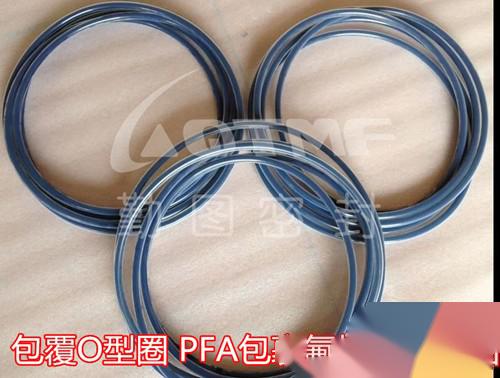Introduction to Coated O-Rings:
(Full name: Fanu Coated Sealing Ring, also known as Coated O-Ring, Coated Fluorinated O-Ring) combines the elasticity and sealing properties of rubber with the chemical resistance of PTFE. It consists of an inner core made of silicone or fluororubber and a relatively thin FEP or PFA outer layer. Fanu seals have excellent sealing performance. Rubber O-rings are prone to wear, have poor chemical corrosion resistance, and gas permeability, while pure PTFE O-rings have high hardness and can resist compression but have poor elasticity. The outer coated FEP/PFA O-rings have good swelling resistance and chemical stability (unless exposed to alkali metals, fluorine, and some halides at high temperatures) and exhibit good elasticity near the rubber O-ring. The friction coefficient of FEP/PFA is very low (only 0.1~0.2), and it has excellent gas permeability resistance, making Fanu sealing rings truly applicable in harsh environments.
Product Features:
— Outstanding chemical resistance, suitable for almost all chemical media (strong oxidizers, reducing solvents).
— Excellent corrosion resistance (strong acids, alkaline solvents).
— Wide temperature range -200℃~260℃.
— Good compression resistance ≥30%.
— Wear-resistant (friction coefficient very low, only 0.1~0.2).
— Good swelling resistance (≤0.1%).
— High pressure resistance (up to 60Mpa).
— Excellent sealing durability, increasing service life by 500%.
Applicable Equipment
— Pumps and valves
— Reaction vessels
— Mechanical seals
— Filters
— Pressure vessels
— Heat exchangers
— Boilers
— Pipeline flanges
— Gas compressors
— Dye manufacturing
— Paint spraying
Applicable Industries
— Chemical processes
— Aircraft manufacturing
— Pharmaceutical industry
— Transportation of oil and chemicals
— Refining
— Film industry
— Refrigeration engineering
— Food processing industry
— Papermaking industry
Material Introduction:
1. FEP and PFA materials are essentially very similar, but PFA has better high-temperature resistance than FEP.
Temperature Range:
FEP outer layer: -60℃~205℃, can be used at high temperatures up to 260℃ for a short time.
PFA outer layer: -60℃~260℃, can be used at high temperatures up to 300℃ for a short time.
2. Our company specifies the inner core material standard for Fanu seals as:
Fluororubber E-60C grade
Silicone rubber ZZR 765B grade
The solid Fanu seal is widely used in static and dynamic sealing. The hollow silicone rubber Fanu seal is generally made with a larger wire diameter and is applied in static sealing, with lower hardness and compression resistance compared to the solid Fanu seal.
Hardness:
The average hardness of Fanu seals made of different materials is:
Solid silicone rubber: 85-90
Solid fluororubber: 90-95
Hollow silicone rubber: 75-80
Product Models:
The brand series “Fanu Seal” produced by our company is divided into three series according to the product structure and working conditions.
>> FEP Coated (cross-section can be O-shaped, square, polygonal design)
>> PFA Coated (cross-section can be O-shaped, square, polygonal design)
>> Spring Coated (inner spring can be S-shaped or O-shaped)
Function:
The seamless and uniformly dense FEP/PFA outer layer combined with the rubber inner core ensures that the Fanu seal maintains consistent sealing properties. The elasticity and compression of each point on the sealing ring are uniform, allowing for repeat installation even under continuous pressure. As the pressure of the medium increases, the entire sealing ring is compressed. Fanu seal acts like a high-viscosity liquid, transmitting the pressure applied to it in all directions without reduction.
Compression Resistance:
The presence of the FEP outer layer endows the Fanu seal with good resistance to hardening and brittleness, while the silicone or fluororubber inner core allows the sealing ring to maintain good elasticity even at high temperatures of 205℃. A comparison of the sealing performance of three types of O-rings: Kalrez rubber, fluororubber, and FEP-coated O-ring in compression devices shows that the Fanu seal, formed by combining the physical properties of silicone or fluororubber with the chemical properties of FEP/PFA, retains the rubber properties while exhibiting good compression resistance. The manufacturing of Fanu seals requires strict quality control; a special process is employed to ensure that the FEP polymer completely envelops the rubber core while meeting the required standard tolerances. The materials used demonstrate our commitment to quality in Fanu seal products, based on performance testing and rigorous controls to ensure customer satisfaction and safe use of this product. Compared to any other rubber or pure PTFE O-ring, Fanu seal offers unparalleled sealing performance and longevity, especially in harsh media applications.













